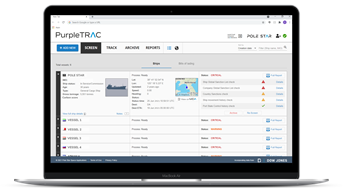Over the past couple of years, we have witnessed the effects of OFAC’s groundbreaking sanctions compliance advisory on the maritime industry. The aftermath saw all maritime trade stakeholders required to meet new standards of due diligence. And, with other regulators, such as the UK’s OFSI and the UN quickly following suit, the whole supply chain has been closely monitored for sanctions violations and illicit trade activity ever since.

What does this mean for your business?
If regulators come knocking, your business will be scrutinised from the top down to ensure that no entity or asset within your supply chain is noncompliant. Consequently, to prevent unwanted regulatory attention, companies must implement more detailed screening processes and ensure a dynamic, behavioural approach for evaluating maritime risk is followed.
Example: Guidance for US companies doing business with Cambodian entities.
Last month OFAC issued an advisory for US companies conducting business with Cambodian entities, due to the high risk of involvement in human rights abuse, criminal activities, and corrupt business practices.
The advisory listed two areas of sanctions risk exposure to look out for while conducting business in Cambodia, including:
- Illicit finance activities and related risks in sectors such as finance and infrastructure.
- Transactions with entities involved in trafficking persons, wildlife, and narcotics in Cambodia and related risks for the manufacturing and timber sectors.
To mitigate these risks, the following measures should be taken while initiating business activities with Cambodian entities:
- Additional due diligence requirements, such as screening counter parties involved in a company’s supply chain.
- A Modern Slavery statement provided to OFAC under applicable laws and effective due diligence in Cambodia to ensure operations and business partners are free from slavery and human trafficking.
What steps should I take to remain compliant with sanctions?
1) Invest in a sanctions screening software that can be customised and tailored to your company’s internal risk parameters.
2) Read the relevant sanctions compliance advisories from regulators such as OFAC, OFSI, and the UNSC.
3) Conduct thorough risk assessments of your whole supply chain, including ship movement history and port state control history to determine the past activity of an asset or entity. This includes all associated companies commercially and operationally engaged with the ship, including the ship’s Beneficial Ownership, Registered Owner, Operator, and Managers, its flag registry, and the associated companies’ country of registration, domicile, and control.
4) Implement effective vessel tracking technology to monitor and track movements and trading patterns, ensuring tracking continuity at all times, as well as notifications when any AIS, Inmarsat, or other satellite tracking terminal is switched off, or a vessel is stationary in high risk jurisdictions.
5) Assess draught changes, ship-to-ship (STS) transfers, and other dark activity to monitor a vessel’s behaviour, and which vessels it engages with, if it has stopped transmitting its AIS.

6) Fully investigate the location of suspicious activity; there are high risk STS transfer regions including the Persian Gulf, UAE, Iraq, Malaysia, Hong Kong, off the Coast of China, and the South China Sea that should be approached with extra caution.
7) Verify all documentation, including Bills of Lading and invoices, to ensure that falsified documents aren’t being used to conceal what is being shipped, shipment origin, or fraud.
8) Be aware of complex corporate ownership and management structures that may be used to hide the ultimate beneficiary of vessels and goods. These are indicators of financial system abuse, and are often fronts under which transactions in violation of sanctions are conducted and illicit shipping practices are facilitated.
Streamline these steps using a sanctions screening software like PurpleTRAC
Pole Star’s sanctions screening and compliance solution, PurpleTRAC, enables the automation, streamlining, and recording of your regulatory processes, mitigating the risk of the criminal, reputational, and commercial damage that would occur as a result of non-compliance.
Within the easy-to-use, single-point solution, you can:
- Screen the key aspects of a trade transaction, the vessels used, their associated ownership and management, port state control history, and Bills of Lading, against best-in-class sanctions watchlists in under 30 seconds.
- Calculate the carbon score and environmental impact of a transaction, as well as the vessels in your supply chain, using CarbonChain’s integrated greenhouse gas emissions tool.
- Monitor a ship’s historical or real-time movements and dark activity, and be notified of high-risk points of call or suspicious behaviour indicating potentially illicit activity.
- Generate that all-important audit trail for demonstration of best efforts in compliance should regulators ever come knocking.
Click here to request a demo and free trial for our RegTech solution, PurpleTRAC.
